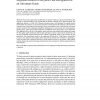Free Online Productivity Tools
i2Speak
i2Symbol
i2OCR
iTex2Img
iWeb2Print
iWeb2Shot
i2Type
iPdf2Split
iPdf2Merge
i2Bopomofo
i2Arabic
i2Style
i2Image
i2PDF
iLatex2Rtf
Sci2ools
UMUAI
1998
1998
Bayesian Models for Keyhole Plan Recognition in an Adventure Game
We present an approach to keyhole plan recognition which uses a dynamic belief (Bayesian) network to represent features of the domain that are needed to identify users’ plans and goals. The application domain is a Multi-User Dungeon adventure game with thousands of possible actions and locations. We propose several network structures which represent the relations in the domain to varying extents, and compare their predictive power for predicting a user’s current goal, next action and next location. The conditional probability distributions for each network are learned during a training phase, which dynamically builds these probabilities from observations of user behaviour. This approach allows the use of incomplete, sparse and noisy data during both training and testing. apply simple abstraction and learning techniques in order to speed up the performance of the most promising dynamic belief networks without a significant change in the accuracy of goal predictions. Our experimenta...
| Added | 23 Dec 2010 |
| Updated | 23 Dec 2010 |
| Type | Journal |
| Year | 1998 |
| Where | UMUAI |
| Authors | David W. Albrecht, Ingrid Zukerman, Ann E. Nicholson |
Comments (0)

